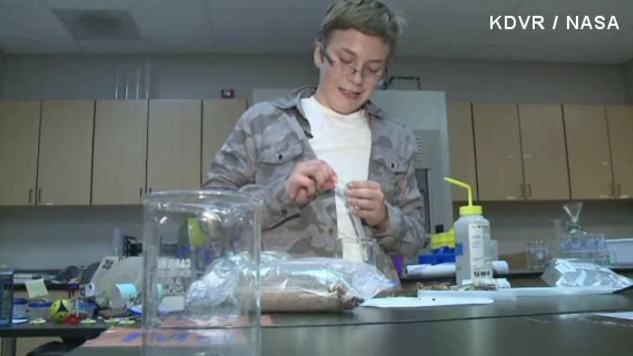Michal Bodzianowski, 11-Year-Old Colorado Boy, Will Brew Beer In Space [PHOTO]

An 11-year-old Colorado boy may have found a way to literally make a beer that’s out of this world.
Michal Bodzianowski, a sixth grader at Douglas County's STEM School and Academy in Highlands Ranch, Colo., recently won a national competition where his beer-making experiment will be flown to the International Space Station, the Denver Post reports.
"I really didn't expect this from the start," Bodzianowski told KDVR. "I just designed this experiment to get a good grade in my class."
The National Center for Earth and Space Science Education sponsored the competition where 11 proposals, out of 744 submitted by 3,900 students, were selected for the flight that will launch in December.
Bodzianowski said the idea of bringing beer to space stemmed from a book he read about the Middle Ages.
"It was a punishment for crimes, that you couldn't drink beer," Bodzianowski said describing the book called “Gruesome Facts” that explained why beer was popular during medieval times, "and most people didn't survive (that) because the water was contaminated."
In space, Bodzianowski says that beer can be used “in future civilization as an emergency backup hydration and medical source." That way, if a project explodes, that wounds people and contaminates the water, "the fermentation process could be used to make beer, which can then be used as a disinfectant and a clean drinking source."
His teacher, Sharon Combs, is proud of Bodzianowski’s success. “I never expected it to be one of my sixth graders,” Combs said. “But Michal’s got the natural curiosity of people who go after science. He’s very talented.”
Bodzianowski’s experiment will be flown to the International Space Station out of Cape Canaveral in December. Once in space, an astronaut will follow Bodzianowski’s instructions and combine the ingredients of hops, malted barley, yeast and water in a 6-inch silicon tube.
"We're just trying to get the yeast to react with the ingredients of beer," Bodzianowski said. "If it doesn't react at all, this tells you it won't work."
Despite the risks, Bodzianowski remains optimistic. "It's going to be the greatest moment of my life, so far," he said.
© Copyright IBTimes 2025. All rights reserved.




















